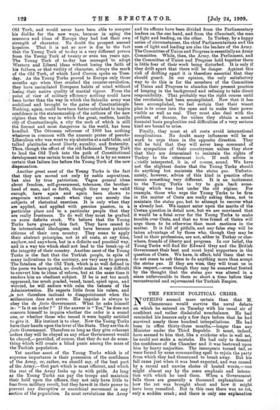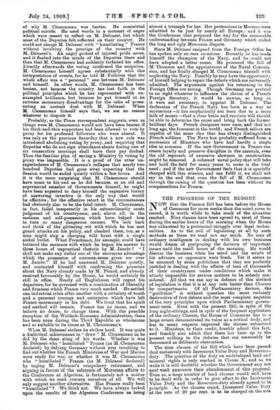THE FRENCH POLITICAL CRISIS.
NOTHING seemed more certain than that M. Clernenceau would survive the naval debate on which he entered on Tuesday with his usual air of confident and rather disdainful nonchalance. He had reminded his hearers only a few days before that he had survived nearly three hundred interpellations. He had been in office thirty-three months,—longer than any Minister under the Third Republic. It must, indeed, have seemed to him that, like a cricketer who is well set, he could not make a mistake. He had ouly to demand the confidence of the Chamber and it was bestowed upon him by heavy majorities. The insurgents turned tail, or were forced by some commanding spell to rejoin the party from which they had threatened to break away. But his fall came just when it was least expected, and was caused by a casual and unwise choice of heated words,—one might almost say by the mere emphasis and intona- tion with which he used them. When a Government falls there are generally a thousand explanations of how the rot was brought about and how it might have been remedied. But in this case there was no rot, only a sudden crash ; and there is only one explanation of why M. Clemenceau was beaten. He committed political suicide. He used words in a moment of anger which were, meant to reflect on M. Delcasse, but which most of the Deputies felt reflected on their country. He could not charge M. Delcasse with " humiliating " France without involving the prestige of the country with M. Delcasse's. An angry protest of injured pride arose, and it flashed into the minds of the Deputies there and then that M. Clemenceau had suddenly forfeited his office. Directly afterwards the voting confirmed the suspicion. M. Cletneaceau himself agrees substantially with this interpretation of events, for hetold M. Fallieres that the whole affair was a " personal " one between M. Delcasse and 'himself. In other words, M. Clemenoeau has been beaten, not because the country has lost faith in the political principles which he has, represented with nu: exampled brilliance, but because he put himself at an extreme momentary disadvantage for the sake of prose- cuting an. ancient duel with M. Delcasse. When M. Clemenceau himself says that, we see no reason whatever to dispute it.
Probably, as the Times correspondent suggests, even RS things were M. Clemenceau would not have been beaten if his thick-and-thin supporters had been allowed to vote by proxy for his professed followers who were absent. It was only on the previous Saturday that a new rule was introduced abolishing voting by proxy, and. requiring that Deputies who do not sign attendance-sheets during one of six consecutive meetings shall have their pay docked. Thus the familiar plan of saving a Ministry by voting by proxy was - impossible. It is a proof of the utter urn expectedness -of M. Clemenceau's collapse that nearly two hundred Deputies had gone away expecting that the Session would be ended quietly within, a few hours. And it is the more surprising that M. Olemenceau should have come to his. end as he did because, as an old and experienced smasher of Governments himself, he might have been expected to deny himself, the expensive luxury of answering invective in the only way that would be effective ; for the effective retort in the circumstances had obviously also to le the fatal retort. M. Clemenceau, in fact, failed temporarily in his extraordinarily acute judgment of his countrymen, and, above all, in the coolness and. self-possession which have helped him to turn so many dangerous corners. We look back and think of the glittering wit with which he has _met grand attacks,on-his policy, and checked. them, too, as a man might stop a charging wild beast with a single nickel bullet. What Frenchman, for :example, could have bettered the sentence with which he began his answer to three hours of tuipractical rhetoric by M,Jaures "I shall not make any unfair use of the enormous advantage which the possession of common-sense gives me over M. Jaures.' If he had answered M. Delcasse quietly, and contented himself with confirming the promises about the Navy already made by M. Piearel, and already received favourably by the House, he would certainly be still in office. Nearly all Englishmen will regret his departure, for he .governed with a combination of liberality and firmness which France very much needed. He settled one industrial crisis after another with a certainty of touch and. a personal courage and enterprise which have left France enormously in his debt. We trust that his spirit and method will remain. France has no cause, and we believe no desire, to change them. With the possible exception of the Waldeck-Rousseau Administration, there has been none during the Third Republic so wholesome and so suitable to its times as M. Clemenceau's.
When Delcasse strikes he strikes hard. It was quite a dialectical achievement to " draw " M. Clemenceau as he did by the sheer sting of his words. Whether it was M. Delcasse who " humiliated " France (as M. Clemenceau declared) by defying .Germany without ever troubling to find out whether the French Ministries of War and Marine were ready for war, or whether it was M. Clemenceau who "humiliated." 'France (as M. Delcasse declared) by urging M. Delcasse's compulsory retirement, and arguing in favour of the reference of Moroccan affairs to the Conference at Algeciras, is fortunately not a matter with which we need concern ourselves at all. We will only suggest another alternative. Has France really been " humiliated."1) We think not. We have always looked upon -the results of the Algeciras Conference 'as -being almost a triumph for-her. Her pretensions in Morocco were admitted to be just by nearly all Europe; and it was the Conference that prepared the way for. the reasonable understanding between France and Germany' which ended. the long and ugly Moroccan dispute.
Since M. Delcasse resigned from the Foreign Office he has spoken only on rare occasions. Recently lie has made himself, the champion of the Navy, and he could not have adopted a better cause. He procured the fall of M. Thomson and the appointment of the:Naval Commis- sion, and has finally charged M. Clemenceau himself with neglecting the Navy. Possibly he may have the opportunity of himself helping to repair the defects which are universally admitted. The :arguments against his. returning to the Foreign Office are strong. Though Germany can pretend to no right whatever to influence the choice of a French Foreign Secretary, it would be unwise, so long as it were not necessary, to appoint M. Delcasse. The declension of the French Navy has been in a way so mysterious —it has emphatically not been due to a mere lack- of money-that a clear brain and resolute will'should be able to determine the cause and bring back the former -brilliant days. French designers were -once; and' that not long ago, the foremost in the world, and French sailors are capable of the same elan that has always- distinguished French soldiers. The Navy has 'probably 'suffered from a succession of Ministers who have had hardly a single idea in- common. If the new Government in France can create loyalty and preserve discipline in 'the arsenals, even the old reproach of excessive slowness in construction might be removed. A coherent naval policy that will take and hold. the field for many 'years to come is the vital need; and if the new Government feels that it-is-specially charged- with this mission, and can fulfil it, we shall not say in • the end that- even the fall of M. Clemenceau through the raising of the question has -been without its compensations for France.



































 Previous page
Previous page